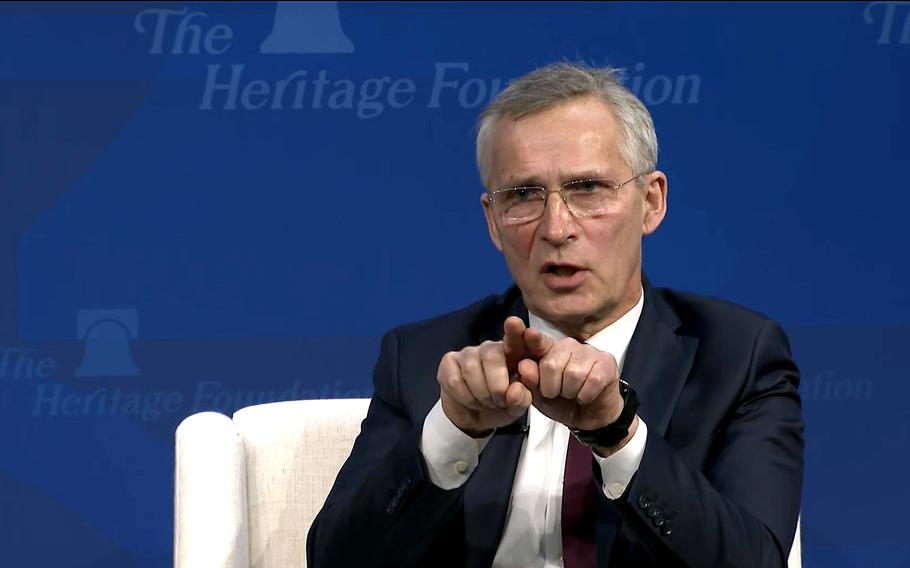
NATO Secretary-General Jens Stoltenberg speaks at the Heritage Foundation, a conservative think tank, in Washington D.C., Jan. 31, 2024. (NATO)
NATO’s top official mounted a defense of the U.S.-led alliance Wednesday at the headquarters of a conservative Washington think tank known for its ties to NATO skeptic Donald Trump.
Secretary-General Jens Stoltenberg, who was in Washington this week to galvanize Western support for Ukraine, took the stage at the Heritage Foundation to talk up NATO before a pro-Trump audience.
“In these dangerous times, we must stand strong against any regime that seeks to undermine us,” Stoltenberg said. “Any sign of wavering or weakening on our part will invite challenges from those who wish us harm.”
Stoltenberg added that NATO is a vehicle for projecting America’s agenda from Europe to the Pacific. Meanwhile, European militaries are a rich market for U.S. weapons makers, who have reaped some $120 billion in sales to allies over the past two years, generating jobs in America, he said.
“NATO is an incredibly powerful idea that advances U.S. interests and multiplies American power … China and Russia have nothing like NATO,” Stoltenberg said. “That is why they are always trying to undermine our unity.”
During the Trump administration, Stoltenberg guided the alliance through a tumultuous period that included intense criticism of NATO by the former president.
While Stoltenberg was dubbed by some NATO watchers as “the Trump whisperer” for his ability to manage that relationship, the former Norwegian prime minister’s stint at the helm of NATO is slated to end later this year.
With Trump leading the race for the Republican nomination and polls indicating a toss-up in a 2024 rematch with President Joe Biden, political officials in Europe have been contemplating the implications of a Trump return for NATO.
Trump has reiterated his long-held ambivalence about the alliance, saying during a recent town hall meeting that his support for NATO “depends on if they (Europeans) treat us properly.”
“NATO has taken advantage of our country,” Trump said during the Jan. 10 Fox News broadcast. “The European countries took advantage.”
Heritage President Kevin Roberts, as he introduced Stoltenberg, also called out European allies for falling short on defense spending. He added that the conservative group was unwilling to back more support for Ukraine so long as the U.S. border crisis remained unresolved.
Stoltenberg, however, said allies have turned the corner on defense spending.
Much of Trump’s criticism about NATO has centered on how a majority of the alliance’s 31 members fall short on defense spending benchmarks that call for all allies to dedicate 2% of their gross domestic product to defense.
Allies have improved in that area, with expenditures steadily rising every year since 2014. Still, some of the largest percentage increases have been made by smaller nations, such as the Baltic states, which have ramped up spending over concerns about Russia.
The major European power, Germany, still falls well short of the 2% mark, and it’s not clear when Berlin will reach the threshold.
U.S. presidents going back decades have had similar criticisms of European defense spending, but stated them in more diplomatic terms and while supporting the idea of the alliance as a critical aspect of global security.
Biden in December signed bipartisan legislation that would prevent a U.S. president from withdrawing from NATO without congressional approval.
The uncertainty about the future course of Washington’s commitment to shared defense comes at a time when concerns about Russian aggression in Europe are growing.
While Russia has suffered extensive casualties in its war in Ukraine, several military leaders in Europe in recent weeks have warned that Moscow could rebuild its forces within the next five years.
Adm. Rob Bauer, the Dutch chairman of the NATO military committee, following a meeting of NATO defense chiefs, said that allies must prepare for the possibility of conflict with Russia.
“I’m not saying it is going wrong tomorrow, but we have to realize it’s not a given that we are in peace,” Bauer said Jan. 18.
While Biden has emphasized repeatedly that the U.S. is prepared to defend “every inch” of NATO territory, Trump’s more vague position on collective defense could increase the angst in Europe.
During his tenure in office, Trump was more blunt behind closed doors than in public, according to European officials.
“You need to understand that if Europe is under attack we will never come to help you and to support you,” Trump reportedly told European Commission President Ursula von der Leyen in 2020.
That statement was brought to light earlier this month by French European Commissioner Thierry Breton, who was present at a meeting of the World Economic Forum in Davos, where the encounter was reported to have happened.
“By the way, NATO is dead, and we will leave, we will quit NATO,” according to Breton’s account of what Trump said.